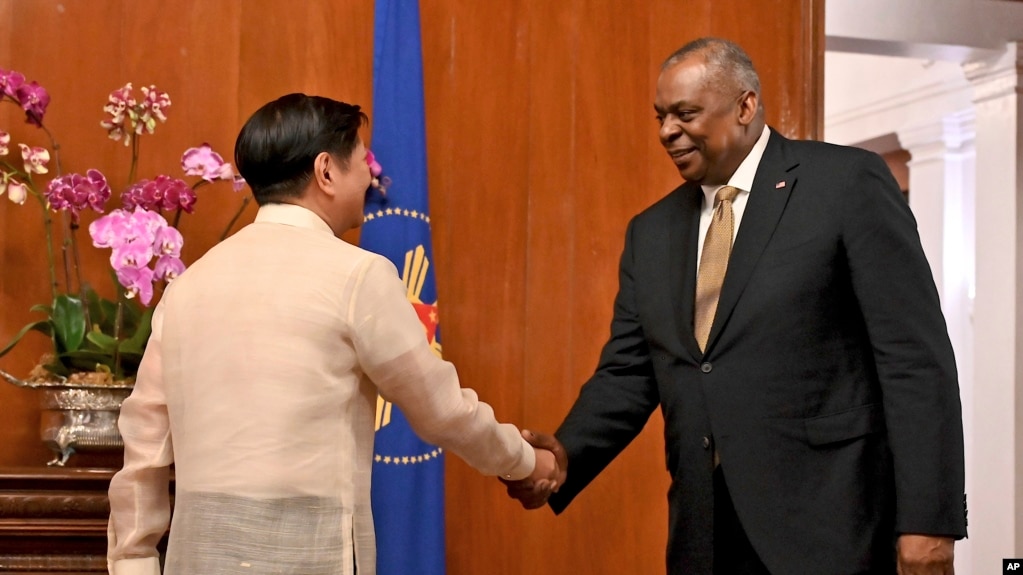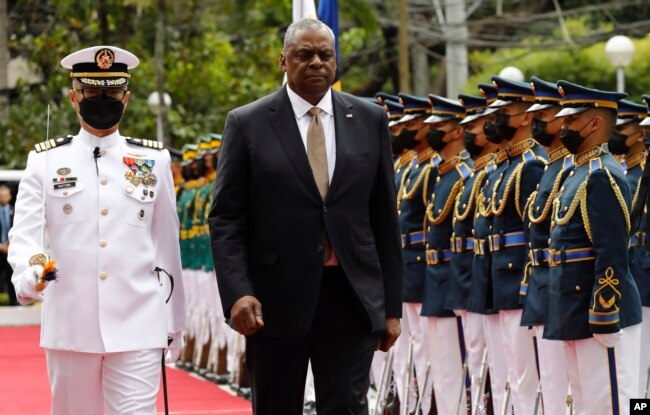Philippines, US Strengthen Ties to Counter China

The United States and the Philippines on Thursday announced plans to expand America's military presence in the Southeast Asian nation.
The U.S. now has access to four more Philippine bases. The agreement comes as the U.S. seeks to counter China’s increasingly aggressive actions toward Taiwan and in the disputed South China Sea.
The two nations reached the agreement while U.S. Defense Secretary Lloyd Austin was in the country for talks.
In an announcement by the Philippines and the U.S., the two said they had decided to move forward in their so-called Enhanced Defense Cooperation Agreement (ECDA). The agreement aims to support combined training, exercises and operations.
As part of the agreement, the U.S. has budgeted $82 million toward structural improvements at five current EDCA sites. The U.S. will also expand its military presence to four new sites in “strategic areas of the country,” the statement said.
Austin’s visit, and the agreement, follow months of high-level talks between the U.S. and the Philippines. The goal of the talks was to improve relations between the two countries and to find ways to deal with China. China has taken an aggressive stand towards the Philippines’ territorial claims in the South China Sea.
Philippine President Ferdinand Marcos Jr., while not naming China, said on Thursday that tensions in the area are “very complicated.”
“It seems to me the future of the Philippines, and for that matter the Asia Pacific, will always have to involve the United States simply because those partnerships are so strong,” Marcos said.
The U.S. has about 500 troops in the Philippines. Of those, 150 are based in Zamboanga, a city that has come under repeated attacks by terrorists.
More recently, U.S. forces have helped train Filipino troops on the nation’s western coast, which faces the South China Sea. The U.S. has also trained Filipino forces in its northern Luzon area across the sea from the Taiwan Strait.
The U.S. defense chief is the latest senior official to visit the Philippines after Vice President Kamala Harris in November. The two countries are trying to improve relations after an uneasy period under past president, Rodrigo Duterte.

U.S. Defense Secretary Lloyd Austin walks past military guards during his arrival at the Department of National Defense in Camp Aguinaldo military camp in Quezon City, Metro Manila, Philippines, Feb. 2, 2023. Rolex Dela Pena/Pool Photo via AP)
Philippine Ambassador to Washington Jose Romualdez said the Philippines needed to cooperate with Washington to prevent any escalation of tensions between China and Taiwan.
Along with the Philippines and Taiwan, the nations of Brunei, Malaysia and Vietnam, are involved in increasingly tense territorial disputes with China in the South China Sea. The U.S. has also promised to come to the defense of the Philippines if it comes under attack in the disputed waters.
The Philippines used to house two of the largest U.S. Navy and Air Force bases outside the mainland U.S. The bases closed early in the 1990s after the Philippine Senate rejected an extension. But American forces returned for combat exercises with Philippine troops under a 1999 agreement.
The Philippine Constitution bans the permanent basing of foreign troops and their involvement in local combat.
Words in This Story
access — n. a way of getting near, at, or to something or someone
site — n. the place where something is, was, or will be located
strategic — adj. of or relating to a general plan that is created to achieve a goal in war, politics, etc., usually over a long period of time
https://learningenglish.voanews.com/a/philippines-us-strengthen-ties-to-counter-china/6945136.html